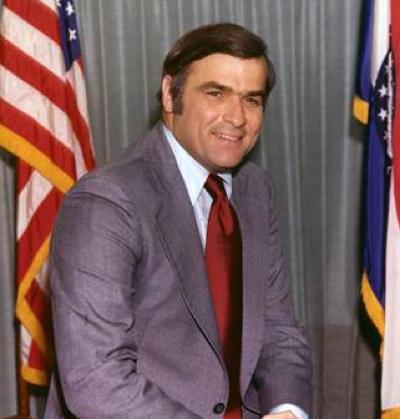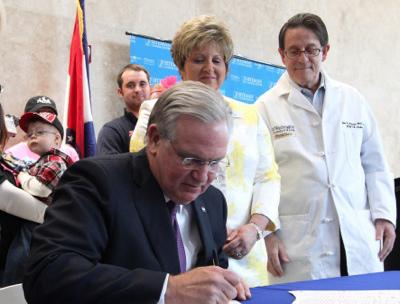
Submitted by
Dee Loflin, SMT Manager/Editor
Jefferson City, Missouri - As families in Missouri and nationwide mark National Mental Health Awareness Month in May, approximately one in four adults suffers from a diagnosable mental illness nationwide, according to the National Institutes of Health (NIH). Unfortunately, many don’t receive the care they need.
We were reminded of this important challenge last month during the devastating events at Fort Hood, Texas. As Commanding General Mark Milley noted in the aftermath of this tragedy, the suspect reportedly sought help for mental illness, and he had a medical history indicating an “unstable psychiatric or psychological condition” that investigators believe to be a “fundamental underlying factor” in this catastrophe. Army Secretary John McHugh also told Congress the suspect was undergoing treatment for depression, anxiety, and sleep disturbances.
There’s no doubt that our military bases on American soil should be the safest place possible for our servicemen and women and for their loved ones. Fort Hood was a terrible loss for all Americans, especially for those who are willing to serve and for their families. In the weeks following, I visited General Leonard Wood Army Hospital (GLWACH) to learn more about the military’s mental health services, and I continue to talk to military leaders in Missouriand inWashingtonas part of my role on the Senate’s defense authorizing and appropriations committees. My goal is to work with our nation’s military leaders to guarantee our servicemen and women, veterans, and military families have access to quality behavioral health treatment – before a mental health crisis takes a terrible turn for the worst.
As part of those efforts, I recently introduced the bipartisan “Caring For America’s Heroes Act” to bring treatment for mental illness in-line with the way physical illnesses are treated for military retirees and their families under TRICARE. I also joined my colleague Senator Debbie Stabenow (Mich.) to successfully pass a version of the “Excellence in Mental Health Act” last month to help address the nation’s fragmented mental health system. This provision establishes two-year pilot programs in eight states to expand access to community mental health services. The original legislation garnered broad support, with 25 Senators co-sponsoring and endorsements from more than 50 mental health, veteran, and law enforcement groups.
Mental illness is just that: an illness. As we recognize National Mental Health Awareness Month, I hope my colleagues will join me in working to improve our nation’s policies. We must start treating behavioral health like physical health if we’re going to expand access and reduce the stigma surrounding mental illness.

Dee Loflin, SMT Manager/Editor
Missouri - Governor Jay Nixon today released the following statement upon the death of former Missouri Gov. Joseph P. Teasdale. The Governor also has ordered flags at all Missouri state facilities to be flown at half-staff until the date of interment for Gov. Teasdale.
Earlier this evening we received the sad news about the passing of a dedicated public servant, former Governor Joseph P. Teasdale. Gov. Teasdale was a good man whose life was guided by a deep and abiding faith and a commitment to public service.
By the time he was elected as Governor in 1976 at the age of 40, Gov. Teasdale already had a record of accomplishment. As an Assistant U.S. Attorney in Kansas City, he headed up the organized crime section; then at the age of 30, he became the youngest prosecuting attorney in the history of Jackson County.
The hallmark of his 1976 campaign was his walking across the state to personally visit with Missourians, and the pages of Missouri’s political history were made richer with the image of “Walkin’ Joe.”
During his tenure as Governor, Gov. Teasdale was especially known for his actions in support of Missouri seniors. He created the Division of Aging, he pushed for passage of the Nursing Home Reform Act, and he supported removal of the state sales tax on prescription drugs.
Georganne and I are keeping the Teasdale family in our thoughts and prayers.

Dee Loflin, SMT Manager/Editor
“In every town across Missouri, you’ll find veterans who served during one of these conflicts in the Middle East,” Gov. Nixon said. “You’ll also find thousands of Missouri families who still have a loved one in uniform in Afghanistan or another country where our military serves. We have a responsibility to honor and respect their sacrifice, and I encourage Missourians to join me in thanking these veterans and their families for what they have done for our country and our state.”
As a member of the Council of Governors, Gov. Nixon has traveled twice to Iraq and three times to Kuwait and Afghanistan since 2009 (most recently in December 2012) to meet with U.S. military and civilian leaders in those countries and to visit with Missourians serving in the Missouri National Guard or the regular armed forces.
In January 2010, Gov. Nixon also launched the Show-Me Heroes initiative, which works with Missouri employers to give first consideration to military veterans when job openings occur. In the past four years, more than 3,500 Missouri employers have taken the Show-Me Heroes pledge, and more than 6,300 veterans have been hired by those businesses since those employers joined the program.

Dee Loflin, SMT Manager/Editor
“No Missourian battling cancer should have to break the bank in order to get the medicine they need,” Gov. Nixon said. “Passed with overwhelming bipartisan support, Senate Bill 668 will make sure insurance companies provide affordable coverage for these lifesaving medications, regardless of how a patient chooses to take them. I appreciate the hard work by members of the General Assembly, including Representative Solon, Senator Silvey and others, to get this bill to my desk and bring more affordable cancer treatment options to Missourians.”
Oral anticancer medications provide patients with a simpler, more convenient and less invasive alternative to chemotherapy delivered intravenously because these pills can be taken at home, often with fewer side effects. Currently, most insurance companies cover these drugs as part of a prescription drug benefit, rather than a medical benefit. As a result, cancer patients taking oral chemotherapy pills have faced significantly higher out-of-pocket costs than those who take their drugs intravenously.
Senate Bill 668 addresses this disparity by preventing insurance companies from treating out-of-pocket costs for chemotherapy pills differently than intravenous drugs. Health insurance companies can comply with the law by limiting the out-of-pocket costs they charge for anticancer medications taken orally to $75 for a thirty-day supply.
“With more and more oral chemotherapy pills coming on the market, this legislation was needed to ensure insurance companies cover these medications in an equitable way,” said Sen. Ryan Silvey (R-Kansas City). “Senate Bill 668 will bring Missouri in line with the majority of other states that have taken this common sense step to make sure Missourians with insurance have access to the cancer treatment option that’s best for them.”
“This legislation is about putting decisions about cancer care in the hands of doctors and patients, rather than insurance companies,” said Rep. Sheila Solon (R-Blue Springs). “Missourians struggling with cancer deserve the best, most effective treatment for their disease. I have been proud to work with my fellow legislators to get this common sense legislation passed, and I appreciate the Governor for signing it today.”
The bill, which is estimated to impact 1.6 million insured Missourians, received strong support from organizations including the American Cancer Society, the Leukemia & Lymphoma Society, and the Missouri Association of Osteopathic Physicians.
“As The Leukemia & Lymphoma Society and our partners in the community invest in research for cures, we want to ensure access to the best cancer treatments for every Missourian,” said Debbie Kersting, Executive Director of the Leukemia & Lymphoma Society – Gateway Chapter. “We applaud Governor Nixon and members of the General Assembly for their strong support of this bill, which will put affordable, effective cancer treatment within reach for Missourians across the state.”
“As the nation’s largest voluntary health organization dedicated to improving cancer care, the American Cancer Society believes all cancer patients should have access to the broad range of therapies needed to combat their disease,” said Stacy Reliford, Government Relations Director, American Cancer Society Cancer Action Network. “Oral chemotherapy is truly the wave of the future in cancer care and offers patients distinct advantages over traditional intravenous chemotherapy, including the fact that they are targeted therapies which attack only the cancer cells, leaving healthy cells alone. This lifesaving legislation will allow patients to use the most appropriate drug without being influenced by their out-of-pocket costs.”
An actuarial study commissioned by the legislature estimated that the legislation would have a negligible impact on insurance premiums.

Submitted by
Dee Loflin, SMT Manager/Editor
Missouri - As top soil has once again made itself visible, school closings have now returned to openings. Businesses and citizens have returned to regular hours and errands, and garden centers along with agriculture are preparing for folks to plant for the upcoming season. March winds typically blow the winter season out and allow the spring season to enter into the picture. To briefly outline, highlights of the House (fyi 2015) budget plans include.
$122 million general revenue increase to K-12 education with a prospected additional increase of $156 million in surplus revenues. $20 million additional dollars for the Access Missouri Scholarship Program. Nearly $7 million for the A+ program. A 3% multi-million dollar increase for funding to Missouri institutions of higher education and additional $10 million to provide equitable funding levels for Missouri community college system.
In the house we understand that education is an economic development tool compiled with a work ethic. Without the latter you only have an education. The need for advanced training and existing jobs along with the technology in creating new opportunities continues to grow.
We were excited this week to have a select group of 4th graders from Caruthersville visit. They were accompanied by teachers and parents. What a well mannered and respectful group they are. We are always thrilled to have visitors from the Bootheel in your Missouri capitol.

